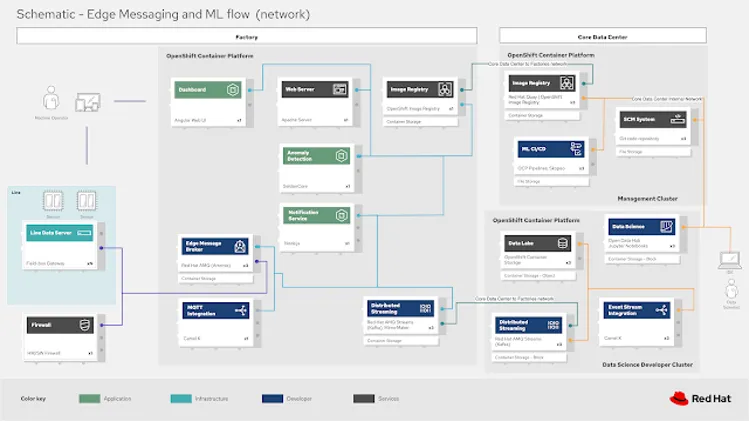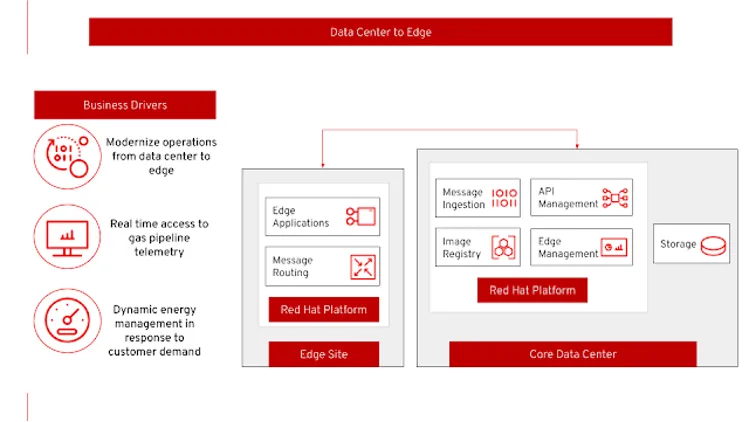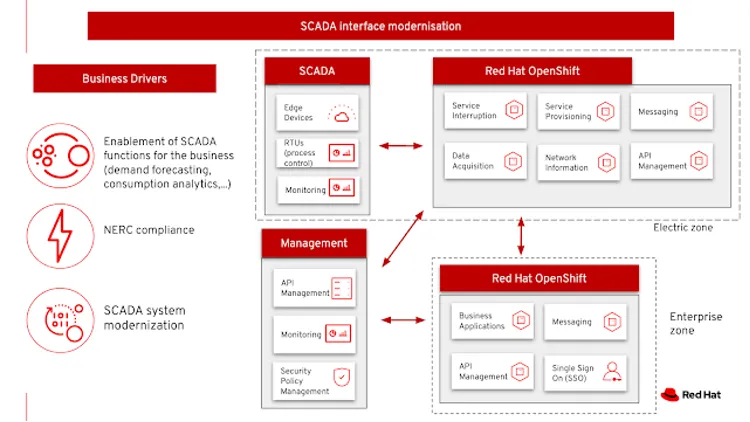Latency can be a major problem for applications that depend upon real-time access to data. Edge computing, which places computing near the user's or data source's physical location, is a way to deliver services faster and more reliably while gaining flexibility from hybrid cloud computing. This speed is vital in industries such as healthcare, utilities, telecom, and manufacturing.
There are three categories of edge use cases:
- The first is called enterprise edge, and it allows customers to extend application services to remote locations. It has a core enterprise data store located in a datacenter or as a cloud resource.
- The second is operations edge, which focuses on analyzing inputs in real time (from Internet of Things sensors, for example) to provide immediate decisions that result in actions. For performance reasons, this generally happens onsite. This kind of edge is a place to gather, process, and act on data.
- The third category is provider edge, which manages a network for others, as in the case of telecommunications service providers. This type of edge focuses on creating a reliable, low-latency network with computing environments close to mobile and fixed users.
For the past few years, Red Hat's Portfolio Architecture team has been developing reference architectures based on customers' real-world use cases in various industries. We have multiple criteria for developing and vetting an architecture collection before we publish it, which you can read about in my intro article about Portfolio Architectures.
We're publishing these architectures for anyone's use on our Red Hat Portfolio Architecture Center and Portfolio Architecture Examples repository.
This article presents architectures centered around edge computing. There are currently five architectures in this collection. I'll provide a short overview of each and allow you to explore them in-depth on your own.

In each of these architectures' GitHub repository (linked in each architecture's description), you'll find a table of contents outlining the technologies used, several example schematic diagrams with descriptions, and a link to open the diagrams directly into the online tooling in your browser.
[ Learn why you should consider using cloud services for cloud-native development. ]
Cloud to edge architecture
The cloud to edge architecture covers the use case for providing a consistent infrastructure experience from cloud to edge and enabling modern containerized applications at the edge.
(Note: This project is a new architecture and is currently in progress. I'll share one of the schematic architecture diagrams, and you can monitor this project for updates as it progresses to completion.)

This architecture brings cloud-like capabilities to the edge locations.
Data center to edge architecture
The data center to edge architecture covers energy and utility infrastructure companies that operate across a vast geographical area that connects the upstream drilling operations with downstream fuel processing and delivery to customers. These companies need to monitor the pipeline's condition and other infrastructure for operational safety and optimization.

The architecture brings computing closer to the edge by monitoring for potential issues with gas pipelines.
Edge manufacturing efficiency architecture
The edge manufacturing efficiency architecture offers additional functionality to manufacturing. The manufacturing industry consistently uses technology to fuel innovation, production optimization, and operations. By combining edge computing, artificial intelligence, and machine learning (AI/ML), manufacturers can benefit from bringing processing power closer to data. This helps them take action faster on concerns like errors and predictive maintenance.

The architecture boosts manufacturing efficiency and product quality with AI and ML out to the edge.
[ Explore top considerations for building a production-ready AI/ML environment. ]
Edge medical diagnosis architecture
The edge medical diagnosis architecture services the healthcare industry. The use case accelerates medical diagnosis using condition detection in medical imagery with AI/ML at medical facilities.

SCADA interface modernization architecture
The supervisory control and data acquisition (SCADA) interface modernization architecture targets energy providers in North America seeking compliance with North American Electric Reliability Corporation (NERC) regulations by modernizing interfaces between their business applications and their SCADA systems. This modernization also provides better information consumption that can be combined with AI/ML and decision-management tools to address customer needs more effectively.

The architecture provides interfaces with SCADA systems that comply with NERC regulations, creating different layers of API gateways to protect business services based on the network zones.
Learn more
These are five of the many reference architectures Red Hat's Portfolio Architects have published, and we'll continue to publish them as we complete them. If you are interested in more architecture solutions like these, feel free to export the Portfolio Architecture Examples repository.
This article originally appeared on Eric D. Schabell's blog and is republished with permission.
About the author
More like this
Red Hat Learning Subscription Course: Skills for the future
14 software architecture design patterns to know
What Can Video Games Teach Us About Edge Computing? | Compiler
The Sysadmin And The Script | Compiler: Re:Role
Browse by channel
Automation
The latest on IT automation for tech, teams, and environments
Artificial intelligence
Updates on the platforms that free customers to run AI workloads anywhere
Open hybrid cloud
Explore how we build a more flexible future with hybrid cloud
Security
The latest on how we reduce risks across environments and technologies
Edge computing
Updates on the platforms that simplify operations at the edge
Infrastructure
The latest on the world’s leading enterprise Linux platform
Applications
Inside our solutions to the toughest application challenges
Virtualization
The future of enterprise virtualization for your workloads on-premise or across clouds
